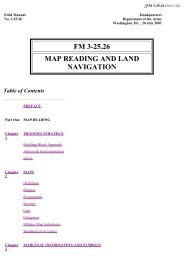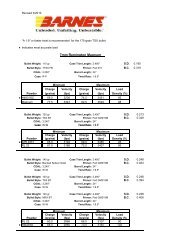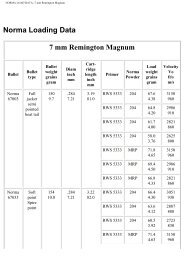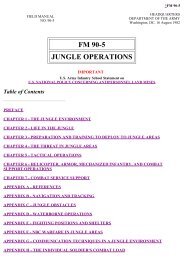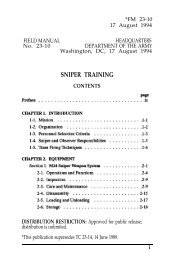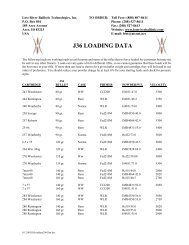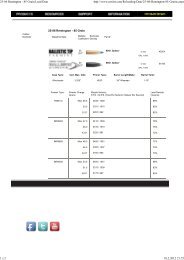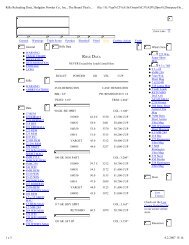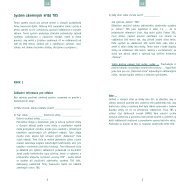FM 17-98 SCOUT PLATOON
FM 17-98 SCOUT PLATOON
FM 17-98 SCOUT PLATOON
You also want an ePaper? Increase the reach of your titles
YUMPU automatically turns print PDFs into web optimized ePapers that Google loves.
APPENDIX B<br />
Nuclear, Biological, and Chemical Operations<br />
Because many potential adversaries have the capability to employ biological, chemical, and nuclear weapons, scouts<br />
must prepare to fight in an NBC environment. Collecting, processing, and disseminating needed NBC hazard<br />
information is also vital. To survive and remain effective on the integrated battlefield, the scout platoon must be<br />
proficient in the three fundamentals of NBC defense: contamination avoidance, NBC protection, and decontamination.<br />
Additional-duty NBC personnel should be designated by the platoon SOP for operations in an NBC environment. The<br />
crews of the section leaders’ vehicles should be designated and trained as chemical agent detection and radiological<br />
survey and monitoring teams. The squad leaders’ crews should be designated as decontamination teams and trained to<br />
operate all decontamination equipment organic to the battalion or squadron.<br />
CONTENTS<br />
Section 1<br />
Section 2<br />
Section 3<br />
Section 4<br />
Contamination Avoidance<br />
NBC Protection<br />
Decontamination<br />
Reconnaissance and Security in an NBC Environment<br />
SECTION 1 — CONTAMINATION AVOIDANCE<br />
Avoidance is the most important fundamental of NBC defense because the best way to survive is to avoid being the<br />
object of an NBC attack. Avoiding contaminated areas minimizes the risk of additional casualties and the degradation<br />
of combat power caused by operating in MOPP level 3 or 4 for extended periods of time. In addition, the unit is not<br />
required to spend the time and resources needed for decontamination. Contamination avoidance measures include<br />
using passive avoidance measures, locating contaminated areas, identifying NBC agents, warning other members of<br />
the platoon as well as other units, and reporting NBC threats to higher headquarters. If the tactical situation does not<br />
allow avoidance, the unit must be prepared to operate in a contaminated environment.<br />
Passive avoidance measures can decrease the possibility of NBC attack or reduce the effects of an attack already under<br />
way. Effective use of concealment, dispersion, prepared positions, OPSEC, and signal security lessen the chances of<br />
being acquired as a target. The scout platoon should continually analyze its vulnerability to NBC attack and take<br />
appropriate protective measures.<br />
Attacks and contamination must be detected quickly and reported to adjacent units and headquarters elements. The<br />
scout platoon must have an effective method of quickly passing the alarm in the event of an NBC attack. The alarm<br />
can be passed by radio, audible signals, or hand-and-arm signals. The SOP should specify automatic procedures for<br />
employing detection teams and submitting the required NBC reports after an NBC attack or when contamination is<br />
encountered.<br />
All movement routes and future positions should be reconnoitered for nuclear and chemical contamination whenever<br />
possible. Reconnaissance and quartering parties should be prepared to encounter, detect, identify, report, and mark<br />
contamination. By finding the location and type of hazard (nuclear radiation or chemical agent), the scout platoon can<br />
determine the best plan for bypassing, crossing, or operating in the hazard. The platoon must be prepared to locate and<br />
evaluate the hazard based on available information from fallout predictions (simplified and detailed), chemical<br />
downwind hazard predictions, monitoring data, and contamination overlays. Based on the situation, the platoon leader<br />
and parent unit commander must be able to implement protective measures specified in the SOP to minimize<br />
personnel losses and limit the spread of contamination.<br />
DEFENSE BEFORE A NUCLEAR ATTACK<br />
The best defense against a nuclear attack is to dig in. Unit defensive positions, which vary from individual foxholes to



